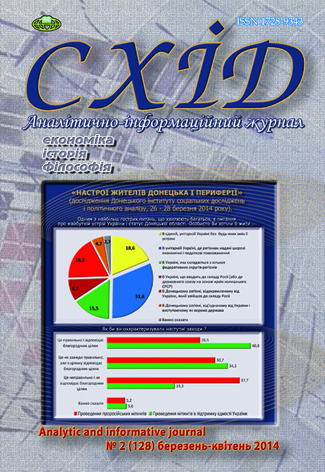"Other" as the central problem of the ethics of Emmanuelle Levinas
DOI:
https://doi.org/10.21847/1728-9343.2014.2(128).24680Keywords:
Other, totality, asymmetry, transcendental reduction, FaceAbstract
The original views of E. Levinas on "Other" are observed in the article. It is stressed that "Other" has been placed in the centre of many ethical discussions since M. Buber, and Levinas continues and develops some of main Buber's intuition that concerns the place "between" I and You. The main idea of Levinas is that "Other" can't be neither reduced nor dissolved in any ontological basis such as transcendental Ego, Being, Logos, God etc. Levinas criticizes the Heidegger's conception of being ("il y a"), which seems to be anonymous and giving rise to irresponsibility, atrocity and all the fears of totalitarian society. According to Levinas, it is not "I" that creates "Other" as alter ego in some kind of symmetry, but it is "Other" that appeals for me, so that my identity completely depends on "Other", or, in a word, is "the Other's gift". "I" and "You" are doomed to be asymmetrical. Thus the central ethical event is Rendezvous (meeting) with "Other", which is considered to be absolute transcendental "face" ("visage") that transgresses the sum of empirical characteristics. The way to reveal the transcendental face of "Other" is the special phenomenological procedure ("epoche") that eliminates the "violence of theory", i.e. all the attempts of objectification of "Other" in abstract notion. It is assumed that this ethical conception of incognizable transcendental face is extrapolation of ancient Jewish theological conception, in which God's otherness is completely transcendental to the world, so that the gap between the divine and the created can never be filled.
Downloads
References
Деррида Ж. Насилие и метафизика / Ж. Деррида // Левинас Э. Избранное: тотальность и бесконечное / Э. Левинас. - М., СПб. : Университетская книга, 2000. - 463 с.
Eskin M. Ethics and dialogue: In the works of Levinas, Bakhtin, Mandel'shtam, and Celan / M. Eskin. - Oxford : Oxford University Press, 2000. - 294 p.
Ямпольская А. В. Эмманюэль Левинас: философия и биография / А. В. Ямпольская. - К. : Дух і літера, 2011. - 376 с.
Вдовина И. С. Э. Левинас и Э. Гуссерль / И. С. Вдовина // История философии. - М. : ИФ РАН, 2003. - Вып. 10. - С. 101-114.
Филоненко А. С. Богословие общения и евхаристическая антропология [Електронний ресурс] / А. С. Филоненко // Научный богословский портал Богослов.ru. - Режим доступу : http://www.bogoslov.ru/text/876935.html.
Левинас Э. Этика и бесконечность. Диалоги с Филиппом Немо / Э. Левинас // История философии. - М., 2000. - № 5. - С. 170-186.
Левинас Э. Тотальность и бесконечное // Избранное: тотальность и бесконечное / Э. Левинас. - М., СПб. : Университетская книга, 2000. - 463 с.
Левинас Э. Избранное: трудная свобода / Э. Левинас. - М., 2004. - 373 с.
Достоевский Ф. М. Братья Карамазовы // Собр. соч. : в 15 т. / Ф. Достоевский. - М., 1990. - Т. 9. - 520 с.
REFERENCES
Derrida J. (2000), Violence and metaphysics, in E. Levinas, Favourites: totality and infinite, University book, Saint-Petersburg, pp. 380-412 (rus).
Eskin M. (2000), Ethics and Dialogue in the Works of Levinas, Bakhtin, Mandel’shtam, and Celan, Oxford University Press, Oxford, 294 p. (engl).
Yampolskaia A. (2011), Emmanuelle Levinas: philosophy and biography, Dukh i Litera, Kyiv, 376 p. (rus).
Vdovina I. S. (2003), E. Levinas and E. Husserl, Istoriya filosofii, issue 10, IFRAN, Moscow, pp. 101-114 (rus).
Filonenko A., The theology of communion and the Eucharistic anthropology, available at: http://www.bogoslov.ru/text/876935.html.
Levinas E. (2000), Istoriya filosofii, issue 5, Moscow, pp. 170-186 (rus).
Levinas E. (2000), Totality and infinity, University book, Moscow, Saint-Petersburg, 463 p. (rus).
Levinas E. (2004), The selected works: hard freedom, AST, Moscow, 373 p. (rus).
Dostoyevskiy F. (1990), The brothers Karamazov, Works, Vol. 9, 520 p. (rus).
Downloads
Published
How to Cite
Issue
Section
License
Copyright (c) 2014 Andrіі Morozov

This work is licensed under a Creative Commons Attribution-NonCommercial-NoDerivatives 4.0 International License.
1. Authors bear responsibility for the accuracy of facts, quotations, numbers and names used.
2. Manuscripts are not sent back.
3. The publisher does not always agree with the authors' opinion.
4. The authors reserve the right to authorship of the work and pass the first publication right of this work to the journal under the terms of a Creative Commons Attribution-NonCommercial-NoDerivatives 4.0 International License. This license allows others to distribute (copy) the published work for non-commercial purposes, provided there is mandatory attribution to its authors and a link to the first publication in our journal.
5. The authors have the right to conclude separate supplement agreements that relate to non-exclusive work distribution in the form in which it has been published by the journal (for example, to upload the work to the online storage of the journal or publish it as part of a monograph), provided that the reference to the first publication of the work in this journal is included.

